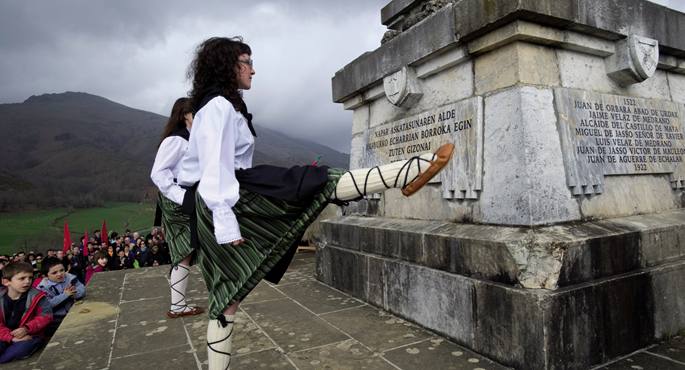A couple of days ago I passed through the town of Amaiur, a rural town of 275 people in the north of Nafarroa Garaia.

It is popular with tourists. In fact when I was walking through that part of Nafarroa, it was full of French people due to the proximity of the town to the border.
For example, I met close to there a group of Breton teenagers who were hiking very far from home. After a brutal climb out of Urdazubi, an interesting town in the South Basque Country, I stopped at the summit because I was busting to go to the loo. The hikers were there taking photos. They asked me how to return to Urdazubi where they had parked their car, apart from going back downhill. So they were looking for a circular route.
I told them I didn't know, but that I was going to Amaiur and that, "I think it's only two or three kilometres". Well while I was in the loo, they went off, and I checked the map and actually it was 4.5 km. So I tried to catch up with them to give them the right information but finally found them at Amaiur, at the ruins of the castle that overlooks the town.

Amaiur is famous among Basque nationalists and popular among tourists for two very different reasons.
Among tourists it's popular because it's a pretty town in an idyllic setting.
Among Basque nationalists it is famous for the last ditch defense of the castle (now in ruins) that took place there in 1522 by the Navarran defenders of Henry II of Navarra, who was trying to regain the lands he had lost against the Castillian invasion, starting with the conquests of Ferdinand II. But it was not to be.
The kingdom of Navarra would be conquered almost completely, only a small part, Nafarroa Beherea, today in the French state, maintaining its independence for a while longer before the French Revolution and Republic stripped away all pretense of autonomy.
In 1922 on the hill where the castle once stood, a monument was erected to commemorate that loss of independence.
In 1931, the monument was destroyed by dynamite in a terrorist attack. At the time, the Navarran government was debating the Statutes of Lizarra, which would have unified the provinces of Araba, Gipuzkoa, Bizkaia and Nafarroa into one single Basque state within the then Spanish Republic, a near recreation of the geographical reach of the medieval kingdom of Navarra.
And fervent desire of Basque nationalists. Unfortunately this political project never came to pass, and the South Basque Country today is still split between different autonomous communities. The Basque Country of today, is a shared cultural and social area, rather than a unified political entity which ceased to exist 500 years ago.
In 1982, so after the fall of the Franco dictatorship, the townsfolk of Amaiur recreated the monument, using the stones from the previous monument. And ever since then it has become a centre of pilgrimage for Basque nationalists as well as a site of active interest for archaeologists.

In this photo, a commemorative event. The text on the monument says:
Napar askatasunaren alde Amayurko echarrian borroka egin zuten gizonai. Betiko argia. 1522.
To the men who fought at the castle of Amaiur for Navarran liberty. Eternal light. 1522.
Further down, in the town itself, there was a sculpture entitled Lore iraunkorrak 'eternal flowers' and also an accompanying text.
This plaque has no translation. All the other informative signs in Amaiur have a Spanish/French/English translation.
This plaque was meant for Basque speakers and only for Basque speakers. Spanish, French, English speakers will pass by without having any idea of what it means. I'm certain that for the group of Breton teenagers for example, Amaiur castle was just a beautiful spot to take a picture from.
I took a picture of the plaque but my phone memory was full so I later called and asked the Amaiur tourist office to send me a photo.


Here is the text:
Madarikatuak eta ohoragarriak
Madarikatuak, madarikatuak...
Zuek, Nafarroako erresumaren independentzia lapurtu zenigutenak
Izan zaitetzte madarikatuak
Zuek, Amaiurko gazteluaren harresiak suntsitu zenigutenak
Izan zaitetzte madarikatuak
Zuek, gure kultura, gure euskara desagerrarazten saiatu zinetenak eta zaretenak
Izan zaitetzte madarikatuak
Eta zuentzat, Amaiurko gazteluan Nafarroako independentziaren, euskal kulturaren eta gure euskararen alde egin zenuten, nafar gudarientzat
Zuentzat gure ohore eta gure lore gure "Lore iraunkorrak"
Josu Goiak asmatu du eta Sebastian Odriosolak gauzaztu ninduten. 2006
The Damned and the Honoured
Damned, damned...
You who have stolen from us the independence of the Navarran kingdom
Damn you
You who tore down the walls of Amaiur castle,
Damn you
You who tried and still try to destroy our culture, our Basque language
Damn you
And for you, who defended our Basque language, our Basque culture, and the independence of the Navarran kingdom at the castle of Amaiur, to all Navarran warriors
For you, our Honour and our flowers, our "eternal flowers".
Josu Goia thought me up and Sebastian Odriosola constructed me.




